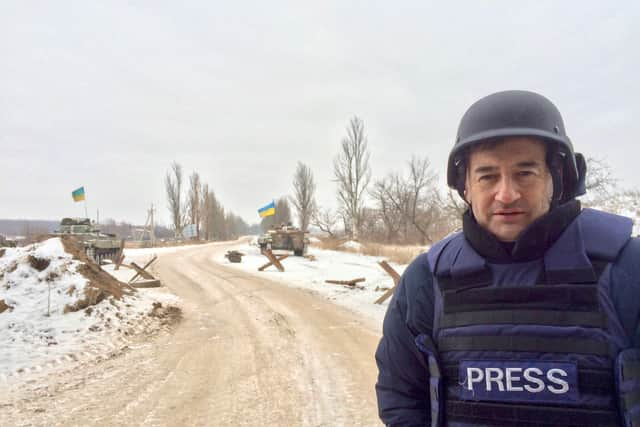Fergal Keane: who is BBC newsreader, when is Living with PTSD documentary on, where has he reported from?
and live on Freeview channel 276
Fergal Keane was a BBC conflict correspondent who left his role after developing Post Traumatic Stress Disorder (PTSD).
He has reported from countries around the world, including Northern Ireland, South Africa, Rwanda, Lebanon, Afghanistan, Iraq and Ukraine.
Advertisement
Hide AdAdvertisement
Hide AdKeane developed PTSD after reporting on the Rwandian genocide in 1994.
In honour of mental health awareness week he will be sharing his story with PTSD in his documentary film, Living with PTSD airing on BBC Two on 9 May at 9pm.
Here’s everything you need to know about Fergal Keane and where he has reported from.
Who is Fergal Keane?


Fergal Keane is a 61-year-old award-winning journalist from Ireland.
Advertisement
Hide AdAdvertisement
Hide AdKeane is a foreign news correspondent with the BBC and reported on conflict up until 2020.
He had previously worked for Irish broadcaster RTE and for the BBC as their Northern Ireland correspondent.
He has reported on unrest around the world, including the South African apartheid and Rwandan Genocide.
In 1997, he was awarded an OBE for his work in the field of journalism.
Advertisement
Hide AdAdvertisement
Hide AdKeane stepped back from his role as a conflict reporter in January 2020, after revealing he had been diagnosed with PTSD in 2008.
In honour of mental health awareness week his documentary film, Living with PTSD will air on BBC Two on 9 May at 9pm.
What happened to Fergal Keane?
Keane was diagnosed with PTSD in 2008, after he developed it whilst reporting on the Rwadian genocide.
He left his role as a conflict correspondent for the BBC in January 2020.
Advertisement
Hide AdAdvertisement
Hide AdIn February 2021, he spoke about his experience in a BBC documentary film for Horizon.
Speaking in a statement about the film Keane said: “I know that PTSD is a silent agony for so many people. It should not be that way. I’m making this film because I passionately believe that we need to be talking about what PTSD is like, where it comes from and how we can deal with it.”
Keane also wrote about his experience with PTSD for BBC News and explained that since his diagnosis the combination of Cognitive behavioural therapy (CBT) therapy and antidepressant medication had helped ease his symptoms.
What is PTSD?
The NHS describe PTSD as: “an anxiety disorder caused by very stressful, frightening or distressing events.”
Symptoms of PTSD include:
- Nightmares and flashbacks
- Repetitive and distressing images or sensations
- Physical sensations, such as pain, sweating, feeling sick or trembling
- Depression
- Avoidance
- Irritability
- Angry outbursts
- Sleeping problems
- Difficulty concentrating
Advertisement
Hide AdAdvertisement
Hide AdRecommended treatments range from talking therapies like CBT, to medications including antidepressants.
Where has he reported from?
Keane has reported on conflict from countries around the world including Northern Ireland, South Africa, Rwanda, Lebanon, Kosovo, Iraq, Afghanistan and Ukraine.
Some of the locations Keane reported from include:
Kigali, Rwanda
Keane was the BBC correspondent for Africa during the Rwandian Genocide.
He reported on the atrocities committed against the Tutsis by the Hutu rebels from the country’s capital Kigali.
Advertisement
Hide AdAdvertisement
Hide AdDuring the genocide an estimated 800,000 people were killed.
It was this conflict that Keane has said caused him to suffer from PTSD.
Baghdad,Iraq
Keane covered the invasion of Iraq from its capital Baghdad in 2003.
Belfast, Northern Ireland
Keane’s first job for the BBC was the Northern Ireland correspondent, reporting on the Troubles in the late 1980s and early 1990s.
Advertisement
Hide AdAdvertisement
Hide AdIn January 2021, he spoke to the Irish News about his PTSD diagnosis and reflected if it had actually begun in Belfast.
Keane said: “I think where it began was in Belfast in the 1980s but by the time I get to Rwanda it gets much worse.”
He continued: “We were witnessing things there that no-one could have prepared us for.”
Comment Guidelines
National World encourages reader discussion on our stories. User feedback, insights and back-and-forth exchanges add a rich layer of context to reporting. Please review our Community Guidelines before commenting.
